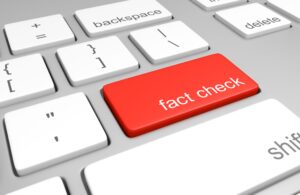May the Facts be With You
Decades ago, when I was at journalism school, I discovered that daily newspapers weren’t fact-checked (no surprise; there was often no time), and magazines were (made sense; longer lead times meant publishers could take that extra care to ensure things were as right as possible). Therefore, I assumed, books must also be fact-checked. It was only around the time that I wrote my first one that I discovered that wasn’t the case.
Publishers would often pay to have a book lawyered–to protect themselves–but not fact-checked. Unless writers could afford to pay to have it done themselves, they relied on their own flawed ability to catch factual inconsistencies (flawed because writers are often too close to the material to see errors) and that of editors, who may be great at catching certain things they know about, but not others.
Elaine Godfrey, in the May 2024 The Atlantic, writes about this very subject. It begins:
“Book publishers don’t employ fact-checking teams, and they don’t require a full fact-check before publication. Instead, a book is usually reviewed only by editors and copy editors—people who shape the story’s structure, word choice, and grammar. An editor might catch something incorrect in the process, and a lawyer might examine some claims in the book to ensure that the publisher won’t be sued for defamation. But that’s it. University presses typically use a peer-review process that helps screen for any factual errors. But in publishing more broadly, no one checks every date, quote, or description. It works this way at all of the Big Five publishers, which include HarperCollins, Simon & Schuster, Penguin Random House, Hachette, and Macmillan. (None of these publishers responded to my requests for comment.)”
No surprise again. Publishers would probably not see an upside in being interviewed since they would have to admit that, nope, they don’t fact-check, and, yep, it’s because it’s too expensive.
Really, you’re probably thinking? All those books I’ve read probably contained factual inaccuracies, if not outright lies? The most recent example, cited by Godfrey, is that of South Dakota Governor and Republican vice-presidential contender Kristi Noem’s new book, No Going Back: The Truth of What’s Wrong With Politics. Reporters discovered a number of passages that appear to be false, including her claim that she met with Kim Jong Un, the despotic Supreme Leader of North Korea, and of canceling a meeting with French President Emmanuel Macron, and an anecdote about a phone call with former UN ambassador Nikki Haley in which she felt “threatened.” (Incredibly, her anecdote about killing her hunting dog and a goat appear to be accurate.)
But there have been many others. One legendary example was James Frey’s memoir, A Million Little Pieces, published in 2004. The website The Smoking Gun found that Frey had fabricated many stories, including ones about his criminal record. He claimed he had hit a police officer with his car while high on crack, leading to a violent altercation with police officers and an 87-day jail sentence. The facts: Frey was never incarcerated, merely spent a few hours at a police station before posting a bond of a few hundred dollars for some minor offenses. And the arresting officer said Frey had been “polite and cooperative.”
Another is that of Jonah Lehrer in his best-selling 2012 book, Imagine: How Creativity Works, about how neuroscience explains the mysteries of creativity. Lehrer wrote: “’It’s a hard thing to describe,’ Bob Dylan once mused about the creative process. ‘It’s just this sense that you got something to say.’” However, there’s no evidence that Dylan said it. It seemed to be a pattern with Lehrer. The philospher Jonathon Keats complained that in Lehrer’s first book, Proust Was a Neuroscientist, the writer included examples that were unambiguously inaccurate.
But where are the publishers in all this? The publishing industry expert, Jane Friedman, told Godfrey that it’s simply “a huge expense,” and trying to fact-check memoirs, in particular, is challenging because so much is based on people’s memories of their past, on family lore, etc.
Early in my career, I did some fact-checking for both enRoute magazine and Maclean’s. While I would never claim to have become the kind of gifted and nit-picky fact-checkers I later met throughout my feature writing career, I learned the basics. Fact-checkers pore over every sentence of a manuscript, highlighting every factual detail and then cross-referencing them to the author’s research or, in many cases, themselves contacting individuals who were quoted to confirm facts. (Although fact-checkers don’t, normally, read back entire quotes.)
Doing that to a magazine-length feature story is one thing, but to a 75,000 word book?
Almost everyone I’ve met, especially those not in the journalism world, express surprise, if not shock, to learn that books are routinely not fact-checked. Books have a gravitas about them, to be trusted, one would think, more than daily newspapers or magazines. As Friedman told Godfrey in her Atlantic article: “People might be a little less likely to [feel that way] if they understood that the publisher is basically just publishing whatever the author said was correct.”
Caveat emptor. This post was not fact-checked by anyone but me.
